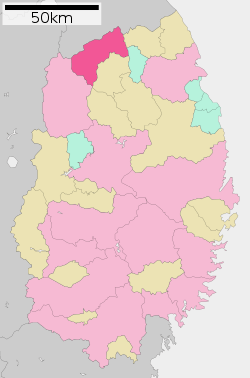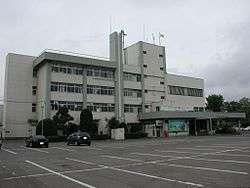Ninohe, Iwate
| Ninohe 二戸市 | |||
|---|---|---|---|
| City | |||
|
Ninohe City Hall | |||
| |||
 Location of Ninohe in Iwate Prefecture | |||
 Ninohe
| |||
| Coordinates: 40°16′N 141°18′E / 40.267°N 141.300°ECoordinates: 40°16′N 141°18′E / 40.267°N 141.300°E | |||
| Country | Japan | ||
| Region | Tōhoku | ||
| Prefecture | Iwate | ||
| Area | |||
| • Total | 420.31 km2 (162.28 sq mi) | ||
| Population (February 2014) | |||
| • Total | 28,452 | ||
| • Density | 67.7/km2 (175/sq mi) | ||
| Time zone | Japan Standard Time (UTC+9) | ||
| City symbols | |||
| • Tree | Toxicodendron vernicifluum | ||
| • Flower | Prunus serrulata | ||
| • Bird | Green pheasant | ||
| Phone number | 0195-23-3111 | ||
| Address | 47, Fukuoka Aza Kawamata, Ninohe-shi, Iwate-ken 028-6192 | ||
| Website | Official website | ||

Ninohe (二戸市 Ninohe-shi) is a city located in Iwate Prefecture, Japan. As of February 2014, the city had an estimated population of 28,452 and a population density of 67.7 persons per km2. The total area was 420.31 km2.
Geography
Ninohe is located in far north-center Iwate Prefecture, bordered by Aomori Prefecture to the north.
Climate
The average temperature is 9.8°C in 'old' Ninohe and 9.9°C in the area that was Jōbōji. The annual rainfall in Ninohe and Jōbōji is 1,011 mm and 785 mm, respectively.
Neighboring municipalities
- Aomori Prefecture
- Iwate Prefecture
History
The area of present-day Ninohe was part of ancient Mutsu Province, and has been settled since at least the Jomon period. During the Sengoku period, the area was dominated by various samurai clans before coming under the control of the Nambu clan during the Edo period, who ruled Hachinohe Domain under the Tokugawa shogunate.
The town of Fukuoka and the villages of Jōbōji, Kindaichi, Gohenchi, Tomai, Ishikiridokoro, and Nisattai were established within Ninohe District on April 1, 1889. Jōbōji was elevated to town status on December 25, 1940. Gohenchi, Tomai, Ishikiridokoro, and Nisattai merged with Fukuoka on March 10, 1955. The modern city was founded on April 1, 1972 with the merger of the town of Fukuoka with the village of Kindaichi. On January 1, 2006, the city of Ninohe annexed the town of Jōbōji.
Economy
The local economy is based on agriculture.
Transportation
Railway
Highway
Local attractions
- Site of Kunohe Castle, a National Historic Site [1]
- Kindaichi Onsen is a popular hot spring resort in the town.
- Tendai-ji temple, founded in the Nara period
Noted people from Ninohe
- Tanakadate Aikitsu – scientist
- Katsuhiko Kashiwazaki – judoka
- Tochinohana Hitoshi – sumo wrestler
References
External links
![]() Media related to Ninohe, Iwate at Wikimedia Commons
Media related to Ninohe, Iwate at Wikimedia Commons
- Official website (Japanese)



